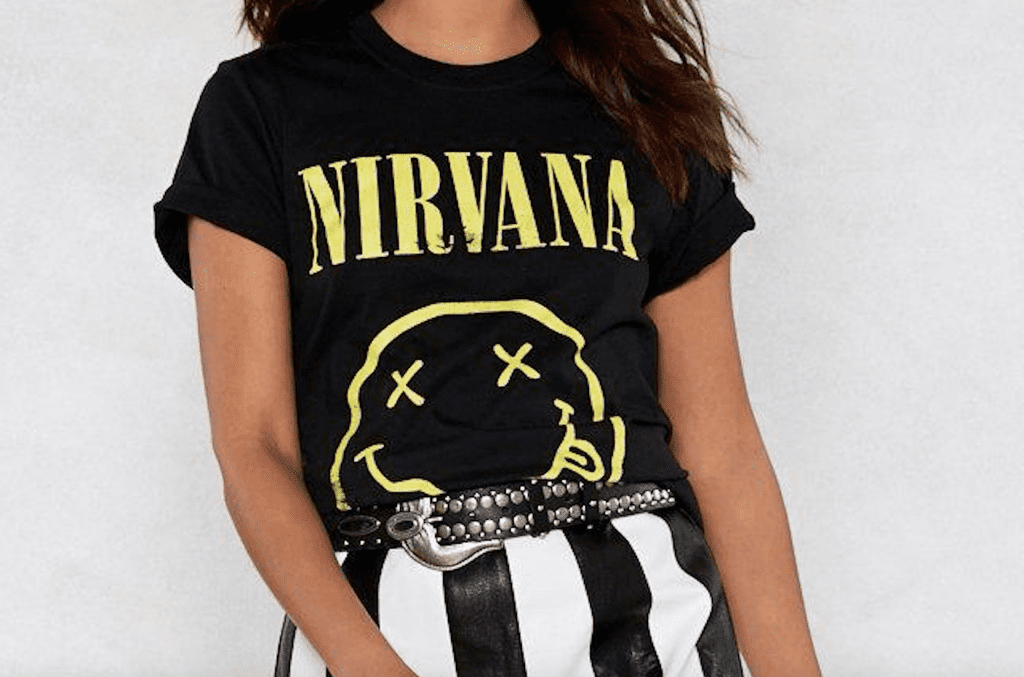The copyright and trademark lawsuit that Nirvana LLC filed against Marc Jacobs for allegedly co-opted its legally-protected smiley face and t-shirt design for the fashion brand’s 2018 Grunge Redux collection has multiplied. The corporate entity for the iconic rock band has since filed a separate-but-related lawsuit against art director Robert Fisher, who recently sought to join the Marc Jacobs case on the basis that he created – and thus, maintains a valid copyright in – the “Smiley Face” design that Nirvana first sold as part of “Happy Face” t-shirts in 1991.
According to the declaratory judgment complaint that it filed on November 11, in which it asked a California federal court to set the record straight about who maintains a valid copyright in the smiley face, Nirvana LLC alleges that “twenty-five years after the death of Nirvana band member Kurt Cobain,” Fisher has come forward, “claim[ing] to own a copyright interest in [the] Smiley Face’ design” and t-shirt design, which Nirvana registered with the U.S. Copyright Office in 1993.
To be exact, Nirvana LLC – which was formed in September 1997 by Dave Grohl, Krist Novoselic, and the Courtney Love-controlled Cobain Estate – asserts that despite the fact that “merchandise bearing that Smiley Face design has been the band’s most popular for years, in the 29 years since the design’s creation, Fisher never claimed any interest in it,” and similarly, he never objected to Nirvana’s “exploitation of the Smiley Face design” or t-shirt design even though he was “in frequent contact with Nirvana’s management team throughout that time.”
Instead, the LLC members allege that Fisher waited until November 2019 to claim “for the first time that he, not Cobain, created the Smiley Face design” and t-shirt design, and until August 2020 to file a copyright application for the design.
Now Fisher “asserts that Nirvana has been using the Smiley Face design for the past almost three decades under an ‘implied’ license he granted to Nirvana,” and that he will “terminate that ‘license’ effective January 1, 2021,” per Nirvana LLC, allegedly making it so that “any further exploitation [of the smiley face design and t-shirt] by Nirvana after that date will infringe his copyright in the Smiley Face design.”
According to Nirvana LLC, such ownership claims by Fisher clash with the fact that Fisher’s former employer Geffen, which Nirvana signed a recording agreement with in April 1991, “has always credited Kurt Cobain with creating the Happy Face t-shirt and Smiley Face design on behalf of Nirvana, and has executed an acknowledgement that grants Nirvana whatever copyright interest, if any, Geffen had in the Happy Face t-shirt design.”
(In the motion and notice of interested parties that he filed with the U.S. District Court for the Central District of California on September 13 in connection with the Nirvana LLC v. Marc Jacobs suit, Fisher claims that despite the widely-accepted belief that the late Nirvana front man Kurt Cobain created the smiley face design, he actually came up with it in 1991 when he was working on other projects for Nirvana – including the cover of the band’s 1991 album, Nevermind – during his tenure as an Art Director at Geffen Records. Fisher claims that while he was, in fact, employed by Geffen at the time, he actually conceived of and created the Nirvana logo and the corresponding t-shirt design when he was off the clock from his day job, thereby, enabling the designs to fall outside of the scope of any agreement that mandated that the rights in the work created by Geffen employees during the course of their employment be assigned to the record label).
With the foregoing in mind, Nirvana LLC is seeking declaratory relief establishing that its U.S. copyright registration for the Smiley Face image and t-shirt design is valid, and that Fisher’s copyright registration – which he allegedly “entered into in bad faith … to slander and cloud Nirvana’s title to its Happy Face t-shirt copyright, so as to secure money from Nirvana that [he] does not deserve” – is not.
It is also seeking a declaration from the court that “any role Fisher played in the creation of the Smiley Face design at issue took place within the course and scope of his employment by Geffen, and thus, any copyright interest in any such work would have been owned in the first instance by Geffen, not Fisher.”
Meanwhile, Marc Jacobs is currently trying to block Nirvana LLC from registering the iconic smiley face graphic with the U.S. Patent and Trademark Office (“USPTO”), initiating an opposition proceeding in September in connection with which the LVMH-owned brand claims that it will be damaged if Nirvana is able to register the x-eyed smiley face. Nirvana has responded by asking the USPTO’s Trademark Trial and Appeal Board to put the opposition on hold in light of the fact that “there is a civil action pending in the U.S. District Court for the Central District of California between the [two] parties, which may be dispositive of the instant proceedings before the Trademark Trial and Appeal Board.”
*The case is Nirvana LLC v. Robert Fisher, 2:20-cv-10324 (C.D.Cal.).











